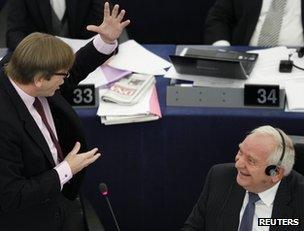Barroso says UK demand put EU internal market at risk
- Published
Jose Manuel Barroso says the UK's demands at the euro summit made "compromise impossible"
The head of the European Commission has said the UK's demand for special treatment for financial services would have risked the single market.
Jose Manuel Barroso told the European Parliament the UK's stance had made compromise impossible at last week's EU summit on economic integration.
The UK vetoed treaty changes for the 27-member EU, arguing it had to protect Britain's financial services industry.
Downing Street denied seeking to "undermine the single market".
A No 10 spokesman said the British Government had been seeking equal, not preferential, status for the City of London in negotiations over financial regulation.
At least 23 other states at last week's EU summit agreed to forge ahead with deeper ties.
Speaking before Mr Barroso in Strasbourg, the President of the European Council, Herman Van Rompuy, said he hoped to see the new fiscal deal signed by most EU states by early March.
They envisage an intergovernmental treaty, or "compact", on stricter fiscal rules.
"Early March at the latest, this fiscal compact treaty will be signed," Mr Van Rompuy said.
The fiscal compact is designed to allow closer monitoring of countries' spending, in order to prevent a repeat of the eurozone's current debt crisis.
British Prime Minister David Cameron's use of the UK's veto in Brussels has strained relations between his Conservative Party and Liberal Democrat coalition allies.
'More Europe'
In his speech to MEPs, Mr Barroso said: "As you know, one member state was opposed to amending the Lisbon Treaty.
"The United Kingdom, in exchange for giving its agreement, asked for a specific protocol on financial services which, as presented, was a risk to the integrity of the internal market.
"This made compromise impossible. All other heads of government were left with the choice between paying this price or moving ahead without the UK's participation and accepting an internal agreement among them."
Mr Barroso said the "greatest" risk of the summit, a split between the 17 euro states and the other 10, had been avoided.
"This is not an agreement at 17-plus, but an agreement at 27-minus," he said.
"Last week, most heads of state or government of the member states showed their willingness to move ahead with European integration towards a fiscal stability union. They showed that they want more Europe, not less."
Tuesday's plenary session of the European Parliament heard wide condemnation from the floor of the UK's position within the EU.
French MEP Joseph Daul, who chairs the parliament's centre-right European People's Party group, told Britain jokingly: "Don't worry, we're not coming with tanks and Kalashnikovs before Christmas."
He said that "26 of the 27 states [had] shown responsibility", agreeing that "shared sovereignty is better than sovereignty taken over by the markets".
'Blunder of a lifetime'

Guy Verhofstadt (left) accused Mr Cameron of making a blunder
German MEP Martin Schulz, who leads the Social Democrat group, blamed speculators in the City of London for the financial crisis.
Guy Verhofstadt, the Belgian former prime minister and leader of the Liberal group, piled condemnation on the British prime minister's position at the summit.
"David Cameron will come to the conclusion that he has made the blunder of a lifetime," he told MEPs.
"There is one golden rule in politics: you only walk away if you are sure that the others will follow," he said, adding: "When you are invited to a table, it is either as a guest or you are part of a menu."
Mr Cameron also came under attack from a Lib Dem MEP, Sharon Bowles. The deal may have "fooled the Lib Dems in London, but it hasn't fooled me", she said, telling fellow MEPs she "abhorred" Mr Cameron's use of the veto.
British Conservative MEP Timothy Kirkhope appealed for calm, saying it was "not the time for hysteria, swagger or melodrama on any side".
"We are still a full member of the European Union and will remain so," he added.
"We have a major trading currency to protect. It makes sense to strengthen the eurozone rules but it makes little sense and seems unfair not to protect the City of London."
Jan Zahradil, the Czech leader of the European Conservatives and Reformists group which includes Mr Cameron's party, sought to defend his British ally.
The British Conservatives, he argued, had been made a "scapegoat" for European divisions.
"What Mr Cameron did was just a defence of his country's national interest," he said.
In other comment, MEP Nigel Farrage, leader of the UK Independence Party, dismissed attempts to revise the Lisbon treaty.
"David Cameron did what he had to do - he was forced into an impossible position, but he gained no concessions whatsoever," he said.
"You've decided to head off on the Titanic towards economic and democratic disaster and we are now in a life boat," the anti-EU politician told the European Parliament.